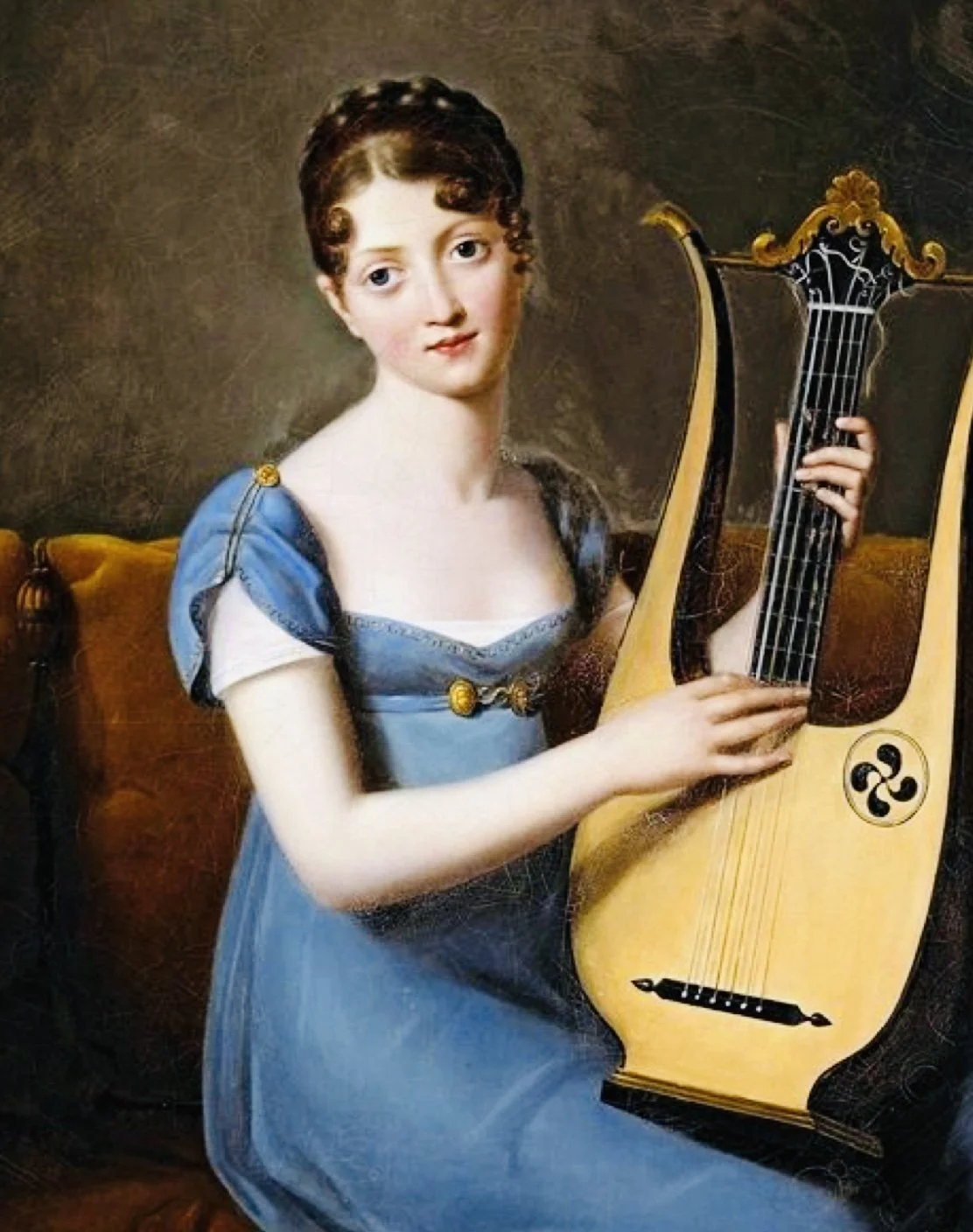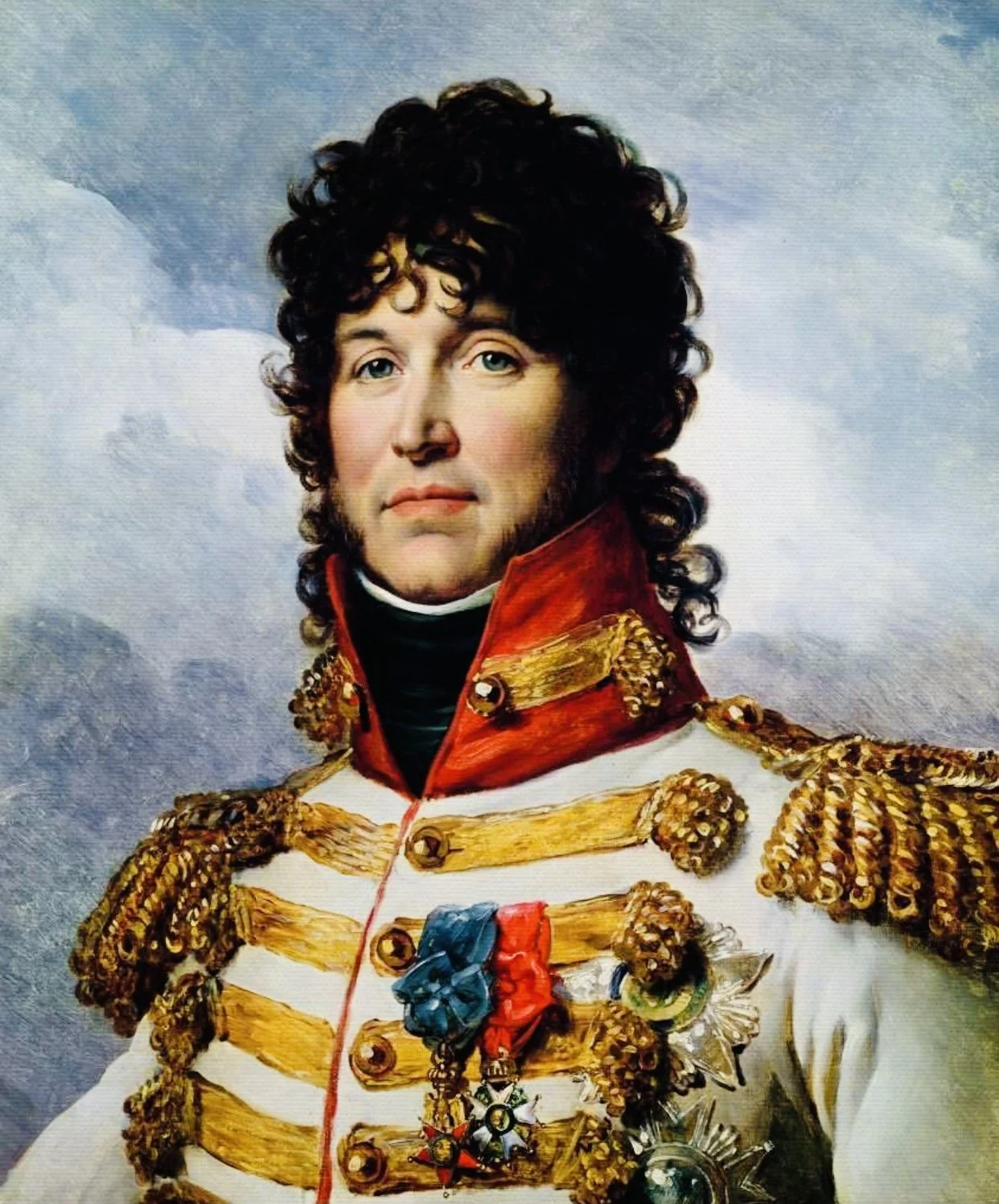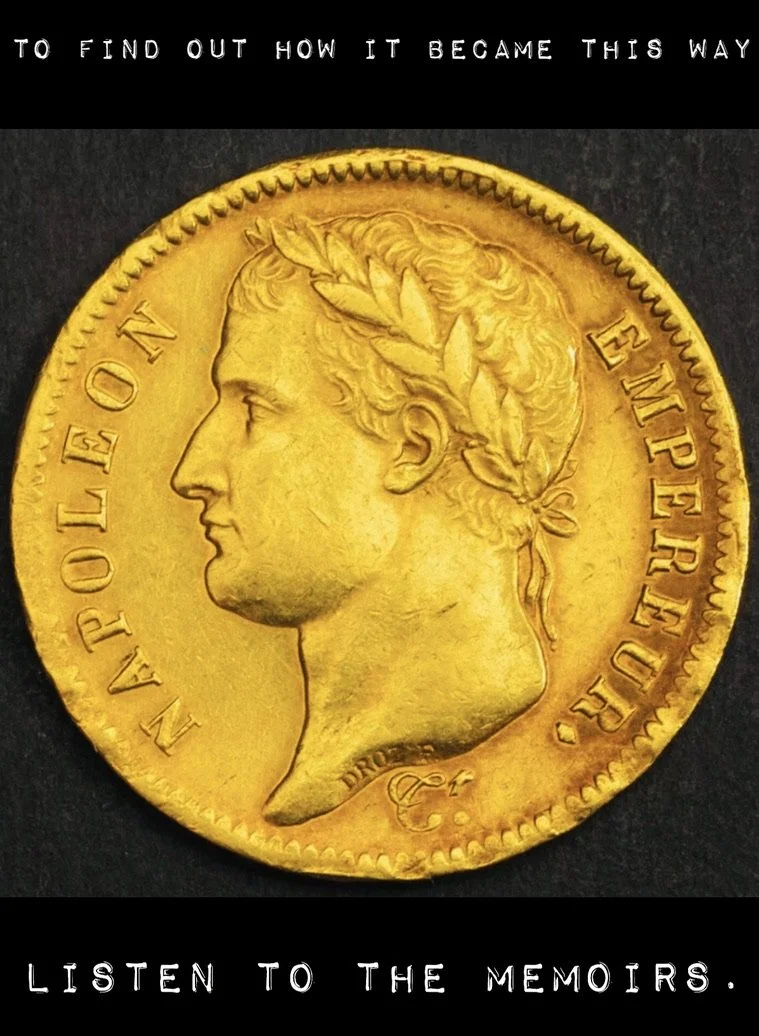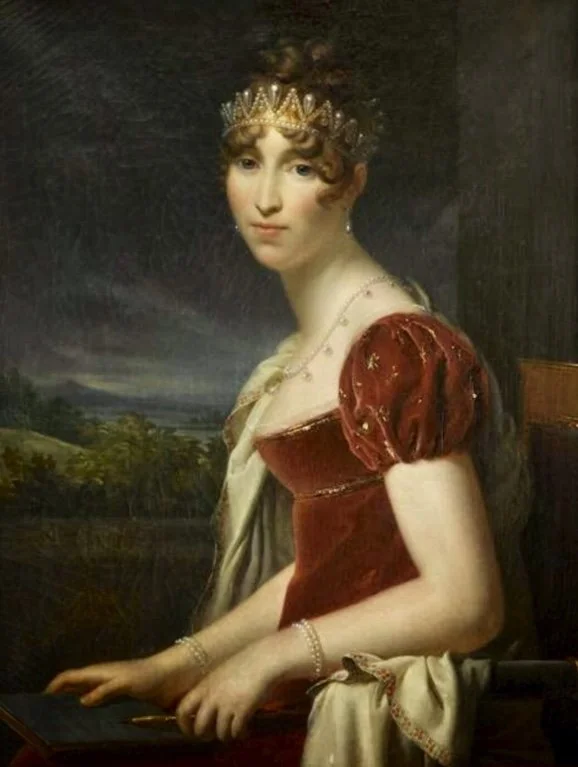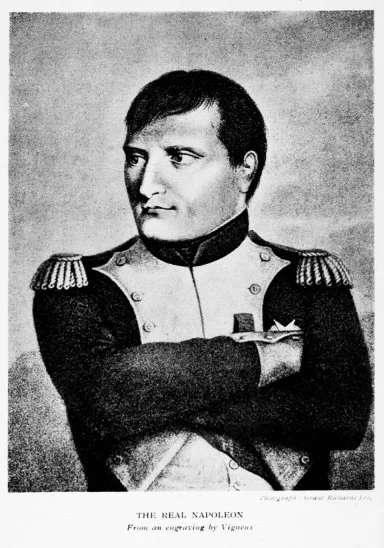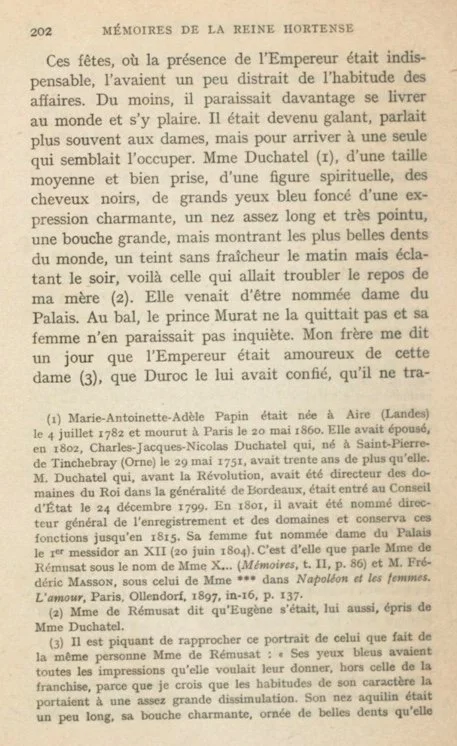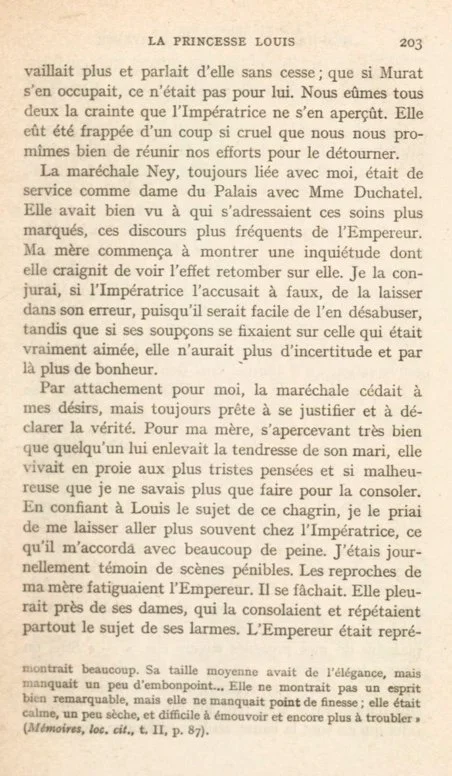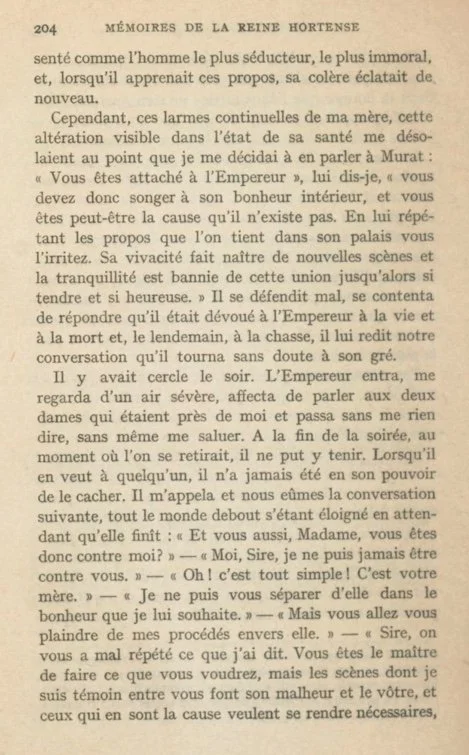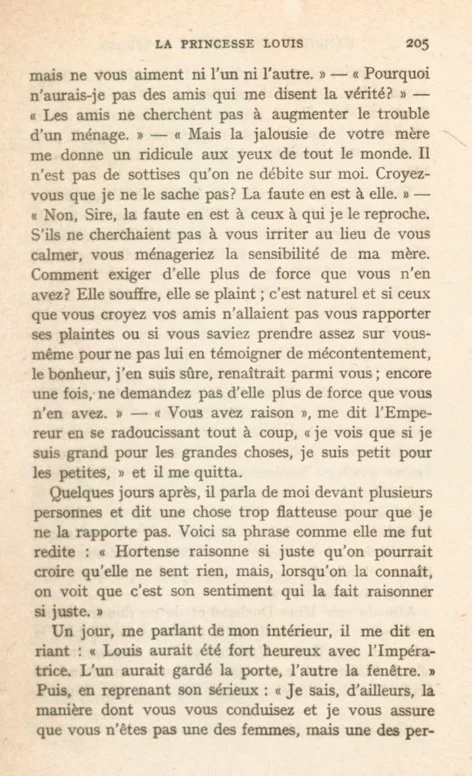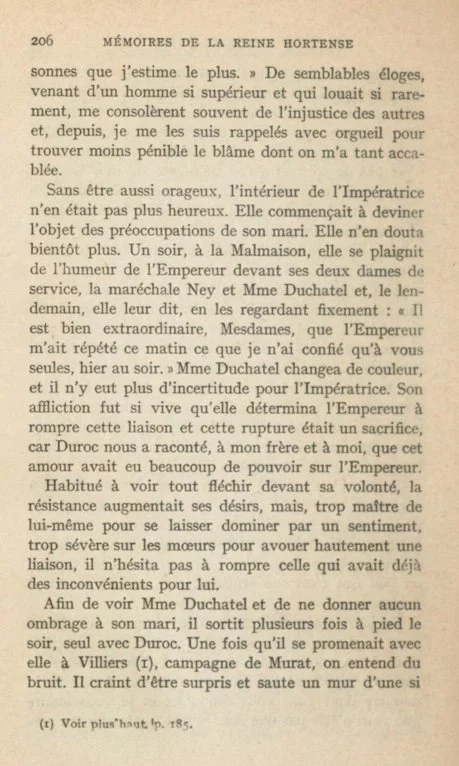Let’s have another look at Hortense’s Memoirs. If you want to read the book it is available for free at the side bar in English and French. Use the widget on the sidebar to translate the text below into pretty much any language.
In this excerpt, Napoleon falls in love with one of the ladies around Josephine.
Hortense’s memoirs continues:
Madame Duchatel was about the average height with a good figure. Her features were animated and intelligent, her eyes large and deep blue with a charming expression. She had a rather long and very pointed nose, a large mouth revealing the most beautiful teeth in the world, a complexion that was dull in the daytime but dazzling in the evening.
Such was the woman who disturbed my mother's peace of mind. Madame Duchatel had just been appointed lady in waiting at the palace. When she was at a ball Prince Murat never left her side, but his wife did not seem disturbed. My brother told me one day that the Emperor was in love with this lady.
Duroc had mentioned to him that my stepfather was not attending to affairs of state as assiduously as he had done previously, but talked about her all the time. He added that Murat's constant attendance on her was not in his own behalf.
We all of us feared the Empress might notice what was going on. Had she done so; it would have wounded her cruelly. We all swore to help one another keep her in ignorance of it. The wife of Marshal Ney, who had always been a close friend of mine, was on duty as lady in waiting at the palace with Madame Duchatel.
I’m pretty sure this is Madame Duchatel. You may notice that the various women Napoleon falls in love with are similar to Hortense and then he loses interest in them but he always continues to treat these women with great kindness. The real story is between the lines.
She had noticed to whom the Emperor addressed most of his remarks, and to whom, he was most attentive. My mother began to show an irritation which my friend feared would vent itself on her. I begged her, if the Empress accused her unjustly, not to undeceive her, because it would be easy subsequently to prove her own innocence, whereas if my mother's suspicions were directed in the right quarter, she could no longer be in doubt and therefore would be unhappy.
On account of her affection for me, my friend agreed to this, but always remained prepared to justify herself and declare the truth. My mother was conscious that someone was depriving her of her husband's tenderness.
She became the prey of the gloomiest thoughts and became so profoundly sad that I no longer knew what to do to console her. I confided to Louis the reasons of her grief and asked him, at the same time, on that account to allow me to visit my mother more frequently.
He acceded to my request but only after making many objections. I frequently was a witness of painful scenes between my mother and the Emperor. His wife's reproaches wearied Napoleon. He lost his temper. She did not attempt to hide her sorrow from her attendants, who consoled her and hastened to spread abroad the reason for her tears.
The Emperor appeared as a dangerous, immoral man. When these reports came back to him, he again became angry. In the meantime, my mother's grief, which was affecting her health, brought me to the point of speaking to Prince Murat.
“You care for the Emperor," I said to him, "therefore you ought to be careful of his family life. instead of that, you are perhaps to blame for the fact that he and his wife are no longer on good terms.
By repeating the remarks, you hear made by people about the palace you irritate him. His nervousness leads to renewed quarrels. This union, which till now has been so tender and close, is being broken up."
Murat, the inventor of the glam rock look.
Murat defended his conduct awkwardly. His only reply was that his devotion to the Emperor was boundless. The next day while they were out hunting, he repeated our conversation to my stepfather, probably changing it to create the impression he wished.
A reception was held at the palace that same evening. The Emperor came in looked at me sternly, pretended to speak to the two ladies who were beside me, and passed me by without a word or even a nod.
At the end of the evening he could no longer contain himself. Whenever he was angry with someone, he was unable to conceal it. He called me to him, and the following conversation took place, the people who were near us retiring to a distance to wait for it to be over:
“So, you too, madame, are against me?"
"I, your Majesty? I could never be against you."
“Oh, it is easy enough to understand. It is your mother's doing."
“I cannot help thinking of and wishing for your mutual happiness."
“But you complain of the way I treat her."
“Your Majesty, my remarks have not been repeated correctly. You are free to act as you choose, but these scenes I witness between you and my mother make you both wretched. Those who provoke them do so in order to make themselves seem important. They are not sincerely fond of either of you."
“Why should I not have friends that tell me the truth?"
“Real friends do not try to increase friction between a married couple."
“But your mother's jealousy makes me look ridiculous to onlookers. All sorts of stupid remarks are made about me. Don't you think I know about them? She is to blame."
“No, your Majesty, those whom I am complaining about are to be blamed for it. If they tried to calm you instead of arousing your anger, you would be more considerate of my mother's feelings. How can you expect her to have more self-control than you have yourself? She suffers and she complains. That is natural enough. If those whom you consider your friends did not repeat her complaints to you, or if you were able to control yourself enough not to show her your displeasure, I am sure you would again be happy together. But, I repeat, do not expect more patience from her than you have yourself."
To find out how it became this way, listen to the memoirs.
“You are right," said the Emperor, suddenly becoming more gentle. "I realize that though I may be great in great things, I am petty in small ones."
With these words he left me. Several days later he spoke about me in the presence of several persons, one of his remarks was so flattering I feel I must record it.
This was the sentence as it was repeated to me "Hortense reasons so clearly that one would think she is not influenced by her emotions. But when you know her well, you realize that her emotions are what make her reason so well."
On another occasion, speaking to me of my married life, he said laughingly, "Louis would have been happier with the Empress. One would have guarded the window while the other guarded the door."
Becoming serious, he added, "I know how irreproachable your conduct is, and I assure you you are not only one of the women but one of the persons I admire the most."
Such a remark coming from a man who was chary of his praise frequently consoled me for the injustice of others. Since then I have remembered it with pride, and that memory has helped me bear the censure of which I received so large a measure. Although not so uncomfortable as mine, the Empress's married life was far from being a happy one.
My mother began to discover who was occupying her husband's mind. In a short time no doubt remained possible. One evening at Malmaison she had complained of the Emperor's mood to the two ladies in attendance, who were Madame Ney and Madame Duchatel.
The following morning, she said, looking at them severely, "Ladies, it is most surprising that the Emperor repeated to me this morning a remark I made only to you last night."
Madame Duchatel's color changed, and no doubt was left in my mother's mind. Her grief was so violent that she succeeded in persuading the Emperor to break off his liaison. The effort was nevertheless a painful one, for Duroc told my brother and me how strong an influence this love-affair had on the Emperor.
He was used to seeing everything bow before his will. Consequently, resistance increased his desire, but he had too much self-control to allow himself to be dominated by his feelings.
Then, also, he was too severe in his judgment of the private life of others to admit publicly that he was entangled in a liaison; and he did not hesitate to put a stop to an affair which was already causing him inconvenience.
In order to be able to see Madame Duchatel and not arouse the suspicions of her husband, the Emperor for several evenings went out on foot alone with Duroc. Once he was taking a walk with her at Villiers, the estate belonging to the Murats, when they heard a noise.
Afraid of being discovered, the Emperor leaped over a high wall at the risk of hurting himself. Duroc, not so excited, did not dare to imitate him. Constantly terrified to see him exposing himself in this way, Duroc was delighted when the liaison came to an end.
I heard through Caroline that the Emperor sent Madame Duchatel his portrait set in magnificent diamonds. She kept the portrait but returned the diamonds as she considered such a gift an insult. Caroline also told me that she had once been asked by the Emperor, when Madame Duchatel was ill, to obtain the letters he had written her. They were supposed to be extremely tender.
Madame Duchatel was never willing to return them. I do not know whether they are still in her possession.
The original French is available below:

